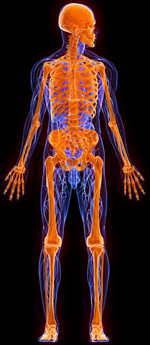Most Get Enough Calcium and Vitamin D in Diet
Michael Lasalandra Beth Israel Deaconess Medical Center Correspondent
MARCH 01, 2011
Critical for Bone Health and Mineralization
Most Americans are getting sufficient amounts of
calcium and vitamin D
to promote bone health without needing to
take supplements, according to a recent report by the Institute of Medicine (IOM), the arm
of the National Academy of Sciences charged with advising the nation on
health matters.
 The report, issued in November, said
calcium and vitamin D are essential to maintaining bone health, but found no evidence that vitamin D carries any other health related
benefits. The IOM issued its report after reviewing nearly 1,000 existing
studies and taking testimony from scientists and others.
The report, issued in November, said
calcium and vitamin D are essential to maintaining bone health, but found no evidence that vitamin D carries any other health related
benefits. The IOM issued its report after reviewing nearly 1,000 existing
studies and taking testimony from scientists and others.
"This has been one of the first systematic reviews of the evidence for the
levels of vitamin D we should be trying to achieve in the population," said
Mary L. Bouxsein, PhD, assistant professor in the Department of Orthopedic Surgery at the
Harvard Medical School Center for Advanced Orthopaedic Studies at Beth
Israel Deaconess Medical Center. "It says that both calcium and vitamin D
are critical for skeletal health."
Both
calcium and vitamin D are essential for bone mineralization. In addition, vitamin D helps in the absorption of calcium. Maintaining
strong bones is critical for fighting off osteoporosis, which can result in frequent broken bones
and other skeletal problems. This is important for the elderly,
particularly for postmenopausal women, but also for young people, so they
don't develop osteoporosis later in life, Bouxsein said.
Recommended Daily Intake and Sources
The IOM did not change recommendations for calcium levels that have been in place since 1997. It did recommend a small increase in the dietary allowance for vitamin D, however.
Calcium
 For calcium, the recommendations stay the same: 700
milligrams per day of the nutrient for almost all children ages 1 through
3; 1,000 milligrams for those ages 4 through 8; and 1,300 milligrams per
day for those ages 9 through 18.
For calcium, the recommendations stay the same: 700
milligrams per day of the nutrient for almost all children ages 1 through
3; 1,000 milligrams for those ages 4 through 8; and 1,300 milligrams per
day for those ages 9 through 18.
For adults, the recommendations also remain at 1,000 milligrams daily for
those ages 19 through 50 and for men up to 71 years and at 1,200 milligrams
per day for women aged 51 and up and for both men and women ages 71 and up.
Food is the best source of calcium.
Dairy products, such as cheese, milk, and yogurt are high in calcium, and
some leafy green vegetables have calcium, though in smaller amounts.
Vitamin D
 For vitamin D, the report urged a
small increase in the recommended daily allowance for most people. The new recommendations are: 600 IUs per day for most people, and 800 IUs
per day for those over age 70. The old recommendations were: 400 IUs per
day for people ages 51 through 70 and 600 IUs per day for those over age
70.
For vitamin D, the report urged a
small increase in the recommended daily allowance for most people. The new recommendations are: 600 IUs per day for most people, and 800 IUs
per day for those over age 70. The old recommendations were: 400 IUs per
day for people ages 51 through 70 and 600 IUs per day for those over age
70.
The key source of vitamin D is sunlight.
This vitamin is found naturally in only a few foods, such as egg yolks and
fatty fish such as salmon and sardines. However, in the United States, milk
and other foods are often fortified with vitamin D.
The report said
most Americans already meet the recommendations in their regular diets.
Some advocates for vitamin D were disappointed the report did not increase
the recommended levels even more than it did. But Bouxsein noted the review
found no evidence for claims that vitamin D can fight other illnesses such
as cancer and heart disease. She said it doesn't mean vitamin D does not
help against other illnesses, but that the studies done so far don't
support the idea.
"It probably means we need more well-designed studies," she said.
Related Links

